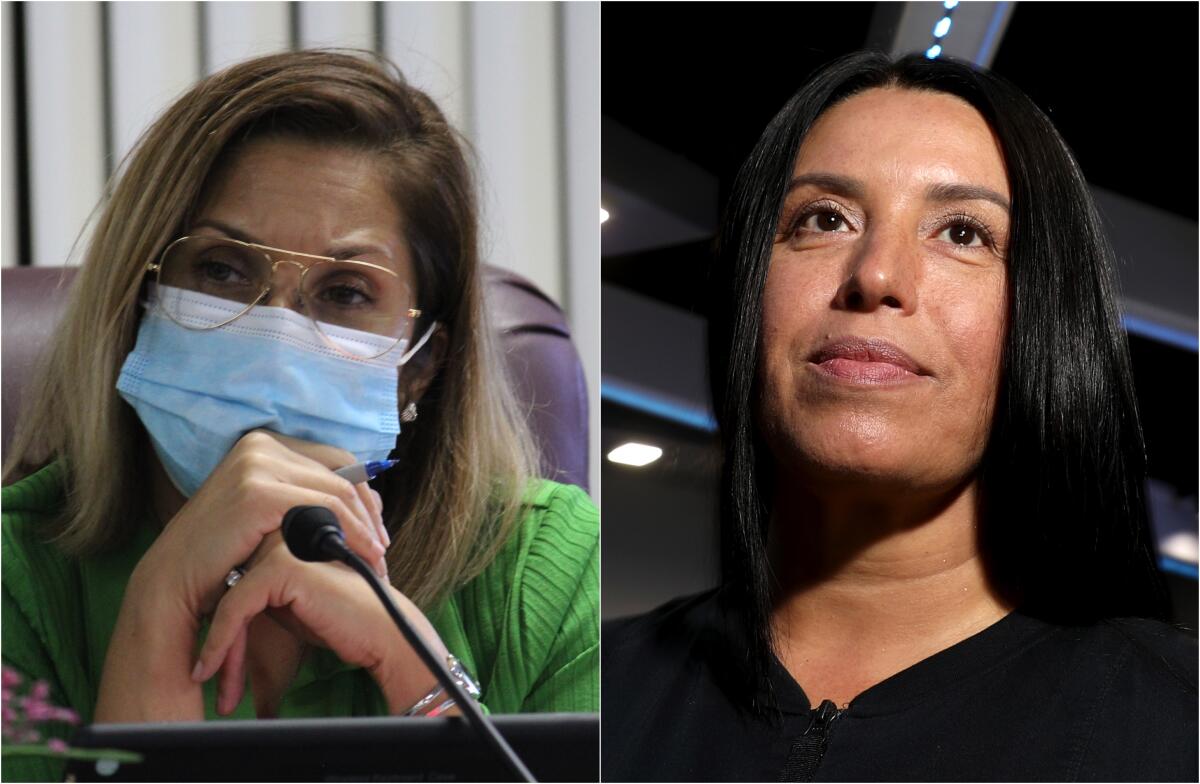In El Monte, a close friendship shatters over cannabis vote, surgery payment

One was a lobbyist and the other was a City Council member, but they also were best buddies who thought they had a special bond.
Sigrid Lopez and Victoria Martinez Muela traveled together on a trip to Cuba. Lopez attended her friend’s 2017 wedding. The two were like sisters, Martinez Muela said, and both were key figures in San Gabriel Valley politics.
For the record:
10:45 a.m. Aug. 1, 2021This article says Councilwoman Victoria Martinez Muela voted to approve contract extensions with Southland Transit on Jan. 24, 2017. Though city meeting minutes record Martinez Muela voting in favor of the contract, video from the meeting shows she did not participate in the vote.
But the friendship shattered when Martinez Muela, a member of the El Monte City Council, voted against allowing retail sales of cannabis in the city, a proposal that Lopez had championed.
Now, Lopez has signed a sworn declaration as part of a complaint submitted to the Los Angeles County district attorney’s office in May alleging that Martinez Muela may have accepted a $1,100 gift from her for a medical procedure and failed to disclose it on financial statements, in violation of the state’s political ethics law.
Lopez said in an interview the money was for breast augmentation surgery for Martinez Muela.
In interviews with The Times, Martinez Muela did not deny accepting the financial assistance, but also said she did nothing wrong. Lopez, she said, was a generous friend who also drove her to and from the procedure, and cared for her afterward.
The district attorney’s office is reviewing the complaint, a spokesman said. It was lodged by Andre Quintero, a prosecutor with the Los Angeles city attorney’s office and a former El Monte mayor who has clashed with Martinez Muela.
In the same declaration, Lopez said she also provided Martinez Muela financial assistance (she said she couldn’t remember the precise date) to help form a nonprofit. The declaration doesn’t specify the amount, but in an interview, Lopez said it was $1,500. Lopez and Martinez Muela are listed in state business filings as officers for a charity called Angel’s Advocate, Inc. Martinez Muela acknowledged receiving assistance but could not recall the amount. The project ultimately never got off the ground.
Lopez told The Times she paid $5,000 in expenses for Martinez Muela on the Cuba trip a few years ago, including hotel, airfare, rum and cigars. The allegation is not part of the complaint submitted to the district attorney’s office. Martinez Muela said the two traveled together, but she paid her own way and that Lopez didn’t buy her rum and cigars.
They both insist theirs was a real friendship: Lopez said any gifts or money she bestowed were not meant to influence decisions by Martinez Muela and the councilwoman said she voted on principle and did not favor her friend.
Martinez Muela, who also works for a mental health nonprofit, insists the complaint is payback for having cast herself as a corruption fighter, raising alarms over conflicts of interest at City Hall and alleged shady dealings related to cannabis licensing.
She and Quintero, who was mayor for 11 years, were part of opposing political factions on the council, and she accuses him of exerting control over Lopez, who now owns pot companies that are mentioned as parties of interest in a lawsuit alleging a pay-to-play scheme in the competition for cannabis licenses in the city. Lopez, meanwhile, said she only signed the declaration about her alleged gift to Martinez Muela because she might be deposed in the lawsuit.
Both women said they feel used and betrayed by the other.
Experts said they’re not surprised the tipping point arose over cannabis, which has become a lucrative source of revenue and fostered corruption in some cities following legalization of recreational use in California.
Adam Spiker, executive director of the nonprofit Southern California Coalition, the Southland’s largest marijuana trade association, said cannabis is a wedge issue that “certainly can exacerbate the political divide.”
Lopez, 52, and Martinez Muela, 48, met at a political event in Sacramento in 2011, after the councilwoman was first elected.
Lopez was a lobbyist for El Monte’s bus route and dial-a-ride contractor, which has a service agreement worth millions of dollars. Her job was to make sure the council members were happy with the company.
Affable and with a knack for building relationships, she said she formed a special connection with Martinez Muela, someone she “looked up to ... like the popular girl in high school.”
“After a while I didn’t look at her as a political official, I looked at her as my best friend,” Lopez said.
In 2016, the week before Christmas, Lopez said Martinez Muela asked her for a personal favor. Martinez Muela was about to undergo breast augmentation surgery, but couldn’t pay the full cost and asked for a loan, Lopez said.
Lopez said she agreed to cover the gap. On Dec. 29 that year, she said she drove Martinez Muela to the clinic of Dr. Daniel J. Casper, a cosmetic surgeon in Pasadena, for the procedure. While there, she said she paid $1,100 to Casper using a debit card.
The declaration included an attached bank statement showing a payment from one of Lopez’s business accounts to Casper. The doctor did not respond to requests for comment.
Martinez Muela said the breast augmentation was needed for a medical condition. She would not comment on whether she disclosed the payment as required. She disputed Lopez’s characterization of the money as a loan, but declined to elaborate. Although not illegal, loans to political figures must be paid back and terms set, otherwise they are designated as gifts.
Records show that Martinez Muela did not report the financial assistance on required financial disclosure statements.
Bob Stern, coauthor of the state’s 1974 Political Reform Act, said Martinez Muela may have violated the prohibition on public officials accepting expensive gifts from individuals with an interest in influencing their decisions, such as lobbyists. She also may have violated the law by not disclosing the gift, he said.
At the time of the procedure, elected officials could not accept gifts totaling more than $460 annually from a single source, the complaint noted.
There are some exceptions, such as gifts from longtime personal friends and acts of human compassion. But Stern said those exceptions didn’t apply because Lopez first met Martinez Muela when she was an elected official, and Lopez was representing a company with business before the council.
“The appearance of this, whether it’s legal or not, is not good at all. It really shows a lack of ethical understanding,” Stern said. “Clearly, the elected official should have known better.”
At the time Lopez allegedly paid for her friend’s surgery, she worked as a lobbyist for Southland Transit, which was seeking to renew its bus services contract.
On Jan. 24, 2017, less than a month after the payment, Martinez Muela joined the council in a 4-0 vote to approve contract extensions with Southland Transit worth nearly $700,000, city records show. That May, Martinez-Muela was absent when the council approved a two-year, $3-million contract with the company.
Lopez said the company never knew about any of her gifts to Martinez Muela. The company’s vice president, Jason Snow, said the business never authorized any such gifts and “never would have approved” of them.
Also in 2017, a cannabis business hired Lopez as a lobbyist to secure the City Council’s support for an ordinance that would allow cultivation in the city, Lopez said.
Lopez said she lobbied Martinez Muela and discussed the proposal with her over lunch at an Italian restaurant in Los Angeles.
Martinez Muela voted that November to grant final approval for the ordinance. The vote was 3-0, with two other council members absent.
More than a year later, the council approved cannabis cultivation, processing and distribution projects near the border with Temple City and Rosemead. Martinez Muela voted in favor of the projects.
But when the City Council approved measures in November 2019 to also allow retail sales, Martinez Muela cast a dissenting vote and on social media described the coalition of pot supporters as “outsiders.” Lopez said she took the remark as an insult that showed Martinez Muela placed politics above their friendship.
“She could have just abstained,” Lopez said.
“Please don’t let this … situation break us,” Martinez Muela says she wrote in a text message, in one of their final exchanges after the vote.
Lopez said she blocked her friend’s number and never spoke to her again.
Martinez Muela said she’d warned Lopez of her decision.
“That’s the difference between politicians and public servants. I am your friend but I have to vote this way because my community demands it of me,” she said.
Since then, she’s called for a state audit of the city and supports accusations in the lawsuit over the city’s cannabis license scoring system that alleges a pay-to-play scheme in which businesses that made tens of thousands of dollars in campaign contributions won licenses.
She accused Lopez of colluding with Quintero, the former mayor who brought the complaint to the district attorney’s office, and current city officials to cover up corruption.
Quintero denied he contacted the district attorney’s office for political reasons, asserting it was his duty as a citizen to report any alleged illegal conduct to the proper authorities.
“It’s unfortunate that she would try to deflect in this way,” Quintero said.
Martinez Muela’s opponents have seized on Lopez’s gift allegations to accuse her of hypocrisy.
“She’s making unfounded allegations about corruption by everyone else around her, and she’s been keeping this secret about her own conduct,” said Councilwoman Maria Morales. “It’s just astonishing.”
Lopez said she signed the sworn declaration on the advice of her attorney, who said that she would likely be deposed in the pay-to-play lawsuit and asked under oath about payments to city officials. In her declaration, Lopez said that she’s never provided financial assistance to any other El Monte council members.
Lopez, no longer a lobbyist, now has her own cannabis businesses, including a dispensary in Maywood. In El Monte, her personal enterprises have drawn attention after receiving two of the six dispensary licenses awarded by the city. Those decisions were handled by the staff and an outside consultant, and the council didn’t vote on them.
Lopez denies having any influence over the process.
Asked what she thought about the friendship in retrospect — whether it was real, or just rooted in politics, Martinez Muela said, “it’s a sad question all politicians have to consider.”
“They always say, when you’re in office everybody will take your call,” she said.
More to Read
Sign up for Essential California
The most important California stories and recommendations in your inbox every morning.
You may occasionally receive promotional content from the Los Angeles Times.











